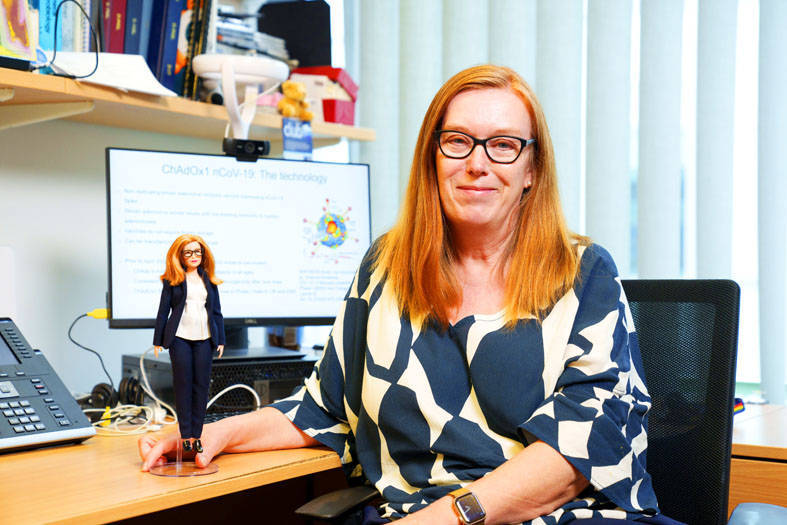《TAIPEI TIMES》 Next pandemic could be more lethal: AZ creator

Sarah Gilbert, professor of vaccinology at the University of Oxford, poses with her Barbie doll in her office at the university in Oxford, England, on Aug. 2. Photo: EPA-EFE
/ The Guardian
The COVID-19 pandemic that has so far killed more than 5 million people worldwide is far from over and the next one could be even more lethal, the creator of the AstraZeneca (AZ) vaccine has said.
As fears grow over the threat posed by the highly mutated Omicron variant of SARS-CoV-2, detected in more than 30 nations, Sarah Gilbert cautioned that while it is increasingly obvious that “this pandemic is not done with us,” the next one could be worse.
Delivering the 44th Richard Dimbleby lecture, due to be broadcast on the BBC yesterday, Gilbert said that despite the destructive nature of a two-year pandemic that has already infected more than 265 million people, the next one might be more contagious and claim even more lives.
“This will not be the last time a virus threatens our lives and our livelihoods,” she said. “The truth is, the next one could be worse. It could be more contagious, or more lethal, or both.”
Gilbert, a professor of vaccinology at the University of Oxford in England whose team developed the AstraZeneca vaccine now used in 170 nations, said that the scientific advances made and knowledge gained in research fighting against COVID-19 must not be lost.
“We cannot allow a situation where we have gone through all we have gone through and then find that the enormous economic losses we have sustained mean that there is still no funding for pandemic preparedness,” she said. “Just as we invest in armed forces and intelligence and diplomacy to defend against wars, we must invest in people, research, manufacturing and institutions to defend against pandemics.”
Gilbert said the Omicron variant contained mutations already known to increase transmissibility of the virus and that antibodies induced by vaccination or previous infections might be less effective at preventing infection, but she also said reduced protection against infection “does not necessarily mean reduced protection against severe disease and death.”
“Until we know more, we should be cautious and take steps to slow down the spread of this new variant,” Gilbert said.
新聞來源:TAIPEI TIMES












